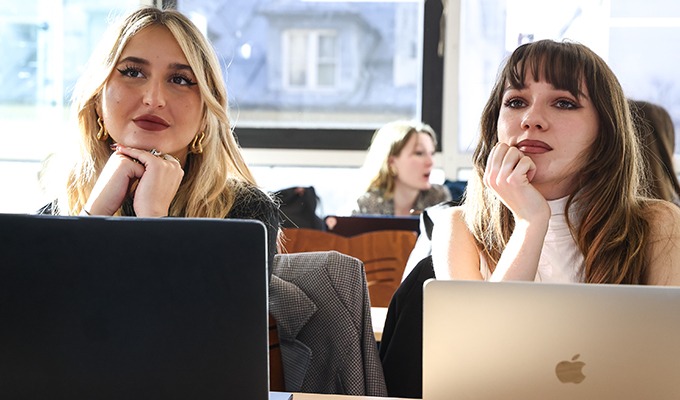- Available in: Paris, Istanbul and online
- Langue : Anglais - Français
- Duration: 3 years
- ECTS: 180
- Next Intakes: january 2026 (EN), september 2026 (FR, EN),
Fashion is a unique industry with its own codes and business models. Managers in this sector, as key links between designers and consumers, must develop skills specific to this market.
Our fashion marketing and management bachelor is structured with modules that allow for a gradual validation of learning objectives while incorporating constant challenges to stimulate each student’s ability to work in multicultural teams. Our faculty is composed of skilled and motivated instructors from over 20 different countries. This true educational melting pot enables our fashion school students to benefit from diverse cultural perspectives, stimulating their ability to analyze and solve problems in creative and unconventional ways.
Within our Bachelor of Fashion Business & Marketing, students are prepared to tackle the many challenges facing today’s brands: increasing globalization, digitalization and virtualization, environmental issues, the fight against waste, and better value distribution…
Learning Objectives
- Pioneer Inventive Fashion Marketing Strategies: Equip students to design and execute cutting-edge marketing strategies that anticipate future industry shifts, leveraging emerging technologies, consumer insights, and cultural trends to create disruptive brand campaigns that set new industry standards.
- Shape the Future of Fashion Business Leadership: Prepare students to lead the next generation of fashion enterprises by developing adaptive management skills that respond to the rapidly evolving global fashion landscape, with a focus on agile decision-making, digital transformation, and inclusive leadership.
- Harness Advanced Digital Ecosystems in Fashion Marketing:Train students to excel in the next wave of digital innovation, utilizing AI-driven data science, virtual and augmented reality, and blockchain technology to create immersive and rich consumer experiences that redefine fashion retail and marketing.
- Champion Progressive Sustainability and Ethics in Fashion: Empower students to spearhead transformative, sustainable, and ethical practices within the fashion industry, focusing on new business models and transparent supply chains to build brands that are both socially impactful and future-resilient.
Year 1
From their very first year, IFA Paris students immerse themselves deeply in their passion for fashion. Through the Bachelor of Fashion Marketing & Management, they develop a solid understanding of the industry, from fashion history to the complexities of creative processes.
Every learning experience in marketing, management, purchasing, distribution, production, etc., highlights the specific characteristics of the fashion industry and their particular societal and environmental impact.
Teachings
All learning is quickly put into practice through case studies provided by our partner companies. A focus on Fashion Tech is particularly achieved through innovative workshops and modules such as fashion data science.
Fundamentals of marketing
- Principles of marketing
- Consumer behavior
- Retail management
- Buying and merchandising
- Digital marketing
Fashion Marketing & Management
- Fashion culture
- Sustainable sourcing
- Accounting
- Fashion industry overview
Fashion’s Environment
- Collection development
- Trend research
- Color theory
- Types of garments
- Textile technology
- Contemporary fashion history
Digital
- AI applied to retail
- Data and Tech applied to sales
- Excel and merchandising
- Computer graphics
- AI and Prompt Engineering
Optional internship or a business case
First-year highlights
- Masterclasses with industry leaders who are shaping current fashion trends
- A chance to experience the vibrant Parisian fashion scene firsthand through visits to iconic boutiques, museums, and design studios
- The Oculus project, which aims to revolutionize the customer experience using virtual reality technology
- Creating a collection plan to understand the strategic and operational aspects of a fashion brand’s product offerings
Year 2
In their second year of the Bachelor’s program in Fashion Marketing & Management, students will delve deeply into the fundamental elements that structure the fashion industry. This process of deconstruction is applied to all new courses, ranging from digital strategy to business management.
The second year is full of experiences. Students dive into fashion event management and become integral parts of organizing and promoting shows for students in the school’s fashion designing programs. In every competition, in every event they organize, bachelor’s students are driven by their ambition to create tangible, innovative, sustainable, and thriving concepts.
Teachings
Fundamentals of marketing
- Strategic marketing
- Branding
- Digital marketing (SEO, SEM)
- Communication
- Visual merchandising
Fashion Marketing & Management
- Budgeting
- Human resources
- Market research
Fashion culture
- Social media management
- Content creation
- Fashion events
Digital
- Excel and merchandising
- Computer graphics
- Data, AI and Tech applied to communication
- AI: Ethical, Social, and Environmental Issues
2-3 month internship or a business case
Second-year highlights
- Participation in organizing the school’s creative events
- Focus on Artificial Intelligence and its impacts on all professions in the industry
- Creation of editorial content for the school’s magazine « We Made »
- Project on measuring the societal and environmental impact of the fashion industry
Year 3
This 3rd year of fashion business training invites students to reflect on the many experiences they have had, the skills they have acquired, and the questions that have arisen during the first two years of the Bachelor’s in Fashion Marketing & Management.
The program encourages the development of critical thinking, analytical skills, and creativity through the challenges inherent in students’ end-of-year project to extend or create a brand. The main objective is to offer our students the opportunity to redefine the codes of the industry while developing their own professional project.
The versatility of the teachings throughout the Bachelor Fashion Marketing & Management program provides students with a level of adaptability that allows them to work in all types of companies in the fashion sector.
This third year of study is particularly professionalizing, with large-scale practical cases that encompass all know-how and a long internship.
Teachings
Project management
- Fashion industry market research
- Forecasts and trend analysis with AI
- Marketing & communication
- Brand activation
- Visual identity
Business Forecast
- Business plan
- Cash flow management
- Risk management
Digital
- Graphic design
- Data, AI and Tech applied to sales
3-6 month internship or a business case
Third-year highlights
- « Fashion with Purpose »: End-of-year project to extend or create a brand, followed by a presentation to a jury of industry professionals
- End-of-year projects exhibition with the option of creating a mockup, a digital brand activation, a virtual store, advanced AI modeling, etc.
Online Format
The online program takes place live and in real-time (Paris or Istanbul local time) and you will interact with the lecturer and other students through our online platform. However, if you cannot attend or miss a live class, every session is also recorded and saved, so you can go back and watch it at a later suitable time for you.
For more information visit our Study Online - Distance Learning page
Material Requirements for Online Format
- A recent computer with a recent operating system
- A good internet connection
- An up-to-date web browser
- Microphone & Headphones (a headset with microphone/headphones is recommended)
- Webcam
- Adobe Creative Cloud
Program Compliance Data
Prerequisites:
- Year 1 Admission: Applicants must hold a Level 4 qualification (equivalent to a High School Diploma)
- Year 2 Admission: Applicants must have successfully completed one year of higher education (equivalent to 60 ECTS credits)
- Year 3 Admission: Applicants must have successfully completed 2 years of higher education (equivalent to 120 ECTS credits)
Course duration
The Bachelor Fashion Business & Marketing takes place over three years. The students benefit from +/- 600 hours of teaching per year.
Teaching methods employed
Classes are held in person (French program) or in a hybrid format (English program) and are structured on the basis of group work, face-to-face teaching, lectures, etc.
Result indicators
- Success rate of the program: 89%
- Overall employment rate at 6 months: 85%
- Employment rate in the targeted profession(s) after 6 months: 80%
Assessment methods
Oral and written assessments, continuous assessment, evaluation during project phases.
Admission Requirements
Prerequisites:
- At least 16 years of age
- High school graduate
-
Depending on the chosen teaching language (English or French), non-native speakers should provide a language proficiency score:
- English teaching language: an IELTS score of 5.5 or above, or a TOEFL score of 65 or above. Alternatively, provide an English training certificate or proof of previous education in English
- French teaching language: a TCF score of B2 or equivalent. Alternatively, a proof of previous education in French
Required documentation:
- Resume
- Motivation letter
- Language proficiency certificate
- Proof of validation of the above-mentioned prerequisite
- Passport photo
- Passport copy for non-EU applicants and ID copy for EU applicants
For more information about the application process, please visit our How to apply page.
Admission Requirements for transfer in 2nd and 3rd year
Prerequisites:
- In addition to the pre-requisites detailed for Year 1, you will need to provide justification of working experience in fashion (short term internships, summer jobs…etc.), as well as a proof of validation of the necessary ECTS credits, or equivalent, required to integrate the level you are aiming for
-
Depending on the chosen teaching language (English or French), non-native speakers should provide a language proficiency score:
- English teaching language: an IELTS score of 5.5 or above, or a TOEFL score of 65 or above. Alternatively, provide an English training certificate or proof of previous education in English
- French teaching language: a TCF score of B2 or equivalent. Alternatively, a proof of previous education in French
Required documentation:
- Resume
- Motivation letter
- Language proficiency certificate
- High school diploma or higher & Transcript
- Passport copy for non-EU applicants and ID copy for EU applicants
- Passport photo
- Most recent academic award proving validation of the necessary ECTS for transfer in your desired level. Detailed academic documents, such as course handbook or syllabi, may be requested to establish credit recognition
For more information about the application process, please visit our How to apply page.

Accessibility
You may be interested in the possibility of enrolling on one of our programs.
Contact us so that we can provide you with all the information and advice you need: accessibilite@ifaparis.com.
